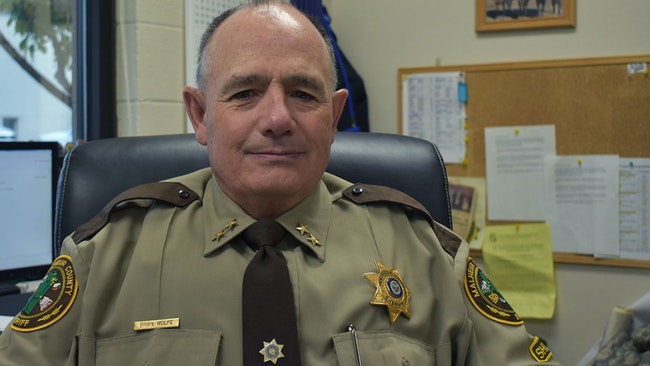
Malheur County Sheriff Brian Wolfe is seeking re-election on the Nov. 3, 2020, ballot. (Enterprise file photo)
VALE – Malheur County Sheriff Brian Wolfe is a busy man.
On a Wednesday weeks ahead of voting in the two-candidate sheriff race, Wolfe said he was juggling a Zoom meeting about “the crisis related to homelessness” and meetings with state Rep. Mark Owens (R-Crane) and a high-intensity drug trafficking program, along with “everyday-type stuff.”
For Wolfe, who has been in office for over nine years, those tasks could include fulfilling any one of 60 state statutes that list duties of the sheriff.
The Malheur County Sheriff’s Office oversees a criminal division – “the men and women running up and down the road, the ones investigating crimes” - a dispatch center and the jail, said Wolfe. Deputies often provide help for calls to 16 other agencies in the county, including the police and fire departments, Treasure Valley Paramedics and the Vale Public Works Department.
In his off time, Wolfe helps local ranchers brand and work their cattle, as well as find a spot on their property for a well, according to the Oregon State Sheriff’s Association.
After working as an officer for the Nyssa Police Department for less than a year, Wolfe joined the Ontario Police Department in 1992, where he was an officer for about four and a half years. He was hired as the Malheur County undersheriff in 1997 and promoted to sheriff in 2011 after former Sheriff Andy Bentz resigned.
According to state campaign finance reports, Wolfe has raised $9,384 for his race, including recent $1,000 contributions from each Cairo Self Storage of Ontario Larry Williams of Tree Top Ranches of Boise and $500 from Harry Bettis, a rancher from Boise; Bentz Insurance of Vale, Rex Maag, a rancher from Vale; Bentz Solutions of Ontario, and the Oregon Propane PAC of Wilsonville.
“Experience matters,” said Wolfe, as does budget understanding, relationships with citizens and other agencies, and well-trained staff.
He said he considers himself politically and economically “very conservative.”
In a perfect world, said Wolfe, the sheriff’s office could afford to employ more staff and “provide a better service than we’re able to provide now.”
“But I also know there’s just no wiggle room in the budget with Malheur County,” he said. “You just make do with what you have.”
Since Wolfe took office, he and his staff worked hard to get Malheur County to be designated as a high-intensity drug trafficking area, he said.
“Why is that advantageous? Because we can get more help combating the war on drugs, and we get a little money to help with that,” he said. “Having said that, we are in a crisis mode right now.”
The designation also allows other state and federal agencies to send help when the sheriff’s office is investigating that trafficking.
“It’s unfortunate that Oregon as a state doesn’t take it as serious as they probably should,” he said. “A couple years ago, first-time possession offenses were reduced from felonies to misdemeanors, and it’s almost impossible for anyone to go to prison on a drug-related offense, unless it’s a huge amount, and possibly multiple offenses. But locally, we have to work harder on the enforcement of illegal narcotics.”
Wolfe’s top priority is resurrecting the local narcotics task force, he said. The task force was comprised of people from the sheriff’s office, the Ontario Police Department, the Nyssa Police Department and Oregon State Police, until some agencies limited their involvement for budget reasons.
“We’re building that back up now, and it’s been taking a lot of my time,” said Wolfe.
The sheriff’s office reports fewer crimes when the task force is operating, said Wolfe.
“We have less violence in the county. We have fewer thefts and fewer burglaries,” he said.
“We’re always looking for ways to better serve the people,” he said. “If we could, we would have 24-hour coverage year-round.”
Wolfe said it’s no secret that from May through August, the sheriff’s office doesn’t provide 24-hour patrols.
“It’s always been a priority for me,” said Wolfe. “The way that you do that is by adding people, and there’s a cost to that. And currently, Malheur county, just to be frank, really can’t afford it.”
In the past, there would be four hours each day during those months without active coverage, meaning deputies would be contacted from home to respond to a call, he said.
Three years ago, Wolfe began having himself, the undersheriff, lieutenant, sergeant and detectives take turns patrolling early in the morning, which cut the time gap to between one and two hours, he said.
In 2015, Wolfe became involved in a federal lawsuit filed against him by former undersheriff Brad Williams, who received $475,000 from the county after alleging that he faced religious discrimination from Wolfe, a member of the Church of Jesus Christ of Latter-day Saints, and that he was terminated that year partly because he complained about mismanagement in the sheriff’s office. Wolfe denied the allegations.
He declined to go into detail about the lawsuit in a recent interview with the Enterprise but said, “We made a decision we believe was the right decision.”
“Now, we run everything by the insurance company and our county attorney before taking any action,” he said, two safeguards he hopes will prevent a similar situation from occurring again. “We’re just trying to vet that a little closer before we do those things now.”
He noted the case was settled out of court by the county’s insurer.
The biggest unexpected challenge Wolfe has faced in his 29-year career in law enforcement, he said, has been the year 2020.
“For a lack of a better term, what a train wreck, starting with Covid,” he said.
The Malheur County Jail, which normally houses up to 104 inmates, is currently at about half capacity to keep them socially distanced.
“Some of those folks aren’t realizing the consequences of their actions, and that’s where it comes into having an impact on local crime rate,” he said.
The other major challenge Wolfe didn’t expect is “the political atmosphere of today,” he said. “You and I may not agree on politics, but to me, that is no reason for us to assault each other. It’s no reason for us to dislike each other and to never speak again, and I’m just amazed at even the violence that has been demonstrated from folks that view political concerns differently. And so that has affected the sheriff’s office too on having to respond to those types of things.”
Wolfe said that Malheur County needs more livable wage jobs and affordable housing, and that a more stable economy would help reduce crime.
The county’s poverty rate was 21% as of July 1, 2019, according to U.S. Census Bureau data.
Wolfe is currently on the board for Community in Action in Ontario, a nonprofit that has been addressing the homeless issue.
With more than 34% of Malheur County’s population being Hispanic or Latino, according to Census data, Wolfe said the sheriff’s office has actively worked to hire more Hispanic employees and offers extra pay to staff who are bilingual, he said.
Wolfe also partnered with Lifeways in Ontario for a jail diversion program for inmates, which he said has been “nothing but successful.”
The program finds resources, treatment and medication if needed for people dealing with mental health crises, who often wind up in jail for committing low-level misdemeanor crimes such as criminal mischief or trespassing.
“What we found,” he said, “is some of those folks that were repeatedly being housed in a jail, when the wraparound services were applied and follow-up was applied after jail, those folks were not coming back to the jail.”
A lieutenant with Malheur County Community Corrections and Lifeways representative were invited to Washington, D.C., to do a presentation on the program, he said.
“Jails and prisons are full of folks that are suffering from mental health crisis, and that’s not the right place for them,” said Wolfe.
While pleased with the partnership’s success, he said, “That doesn’t mean we don’t have a way to go on mental health issues in Malheur County and Oregon. We do.”
But Wolfe, with nearly a decade of experience as sheriff, said he still looks for ways to improve. “I don’t care who you are, there’s always room for improvement.”
RELATED COVERAGE:
ELECTION 2020: Walker faces incumbent sheriff on November ballot in Malheur County
YOU CAN HELP KEEP LOCAL NEWS FLOWING: Reader support allows the Enterprise to provide in-depth, accurate reporting that otherwise would not get done. Keeping the community well informed is essential. SUBSCRIBE – $5 a month, automatically. DONATE – to provide additional support.




